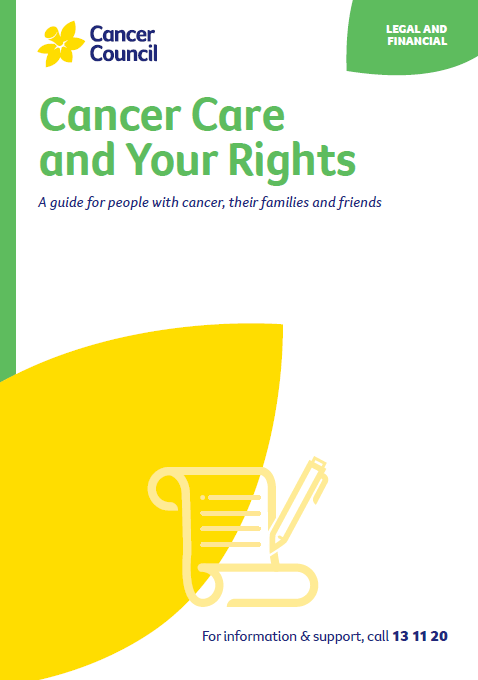- Home
- Cancer Information
- Practical concerns
- Cancer care and your rights
- Health care complaints
- Making a formal health care complaint
Making a formal health care complaint
To make a formal health care complaint, you need to contact your state or territory health complaints organisation. It can be helpful to check if there are any time limits or other conditions you have to meet before making a complaint.
Learn more about:
Overview
Health care complaints should be in writing and can often be made by filling in an online form. If you are unable to make the complaint yourself, a relative, friend, guardian or health professional may be able to lodge the complaint on your behalf.
In most cases, you will be assigned a case officer, who may provide a copy of the complaint to the health care provider and ask them to give their version of events. With your consent, your case officer may also obtain your medical records or other relevant information from the health care provider.
Once the case officer has completed their assessment, the relevant state or territory ombudsman or commissioner will write to tell you how they will deal with your complaint. They may decide to refer it for mediation or conciliation, which is an informal meeting to try to resolve problems.
Serious issues
Issues relating to public health and safety are referred elsewhere within the ombudsman’s or commission’s office for formal investigation.
Serious cases against health practitioners may result in prosecution, and some cases may be referred to a registration board or another organisation for further consideration – learn more about the Australian Health Practitioner Regulation Agency and registration boards.
Health complaints organisations
| ACT | ACT Human Rights Commission 02 6205 2222 |
| NSW | Health Care Complaints Commission 1800 043 159 |
| NT | Health and Community Services Complaints Commission 1800 004 474 |
| QLD | Office of the Health Ombudsman 133 646 |
| SA | Health and Community Services Complaints Commissioner 08 7117 9313 or 1800 232 007 |
| TAS | Health Complaints Commissioner Tasmania 1800 001 170 |
| VIC | Health Complaints Commissioner 1300 582 113 |
| WA | Health and Disability Services Complaints Office 08 6551 7600 or 1800 813 583 |
→ READ MORE: Regulation of health professionals
More resources
Prof Sarah Lewis, Faculty of Medicine and Health, The University of Sydney, NSW; Kevin Bloom, Senior Social Worker, Haematology and Bone Marrow Transplant, Royal North Shore Hospital, NSW; Danielle Curnoe, Consumer; Alana Fitzgibbon, Clinical Nurse Consultant – Gastro-Intestinal Cancers, Cancer Services, Royal Hobart Hospital, TAS; Hall & Wilcox (law firm); Johanna Jordaan, Consumer; Dr Deme Karikios, Medical Oncologist, Nepean Cancer and Wellness Centre, Nepean Hospital, NSW; Melissa Lawrie, Breast Cancer Clinical Nurse, Cancer Services, Gold Coast Hospital and Health Service, QLD; Jacqueline Lesage, Consumer Reviewer, Cancer Voices NSW; McCabe Centre for Law and Cancer, VIC; Louise Pellerade, 13 11 20 Consultant, Cancer Council WA; Andrew Potter, Consumer; Siân Slade, PhD Candidate, Nossal Institute for Global Health and Non-Executive Director (health, disability sectors), VIC; Paula Watt, Clinical Psychologist, WOMEN Centre, WA.
View the Cancer Council NSW editorial policy.
View all publications or call 13 11 20 for free printed copies.
Need to talk?
Support services
Coping with cancer?
Speak to a health professional or to someone who has been there, or find a support group or forum
Need legal and financial assistance?
Pro bono services, financial and legal assistance, and no interest loans
Cancer information
Dealing with the diagnosis
Common reactions to a cancer diagnosis and how to find hope
Resource hub
Guides, fact sheets, videos, podcasts and more for people with cancer, their families and friends

